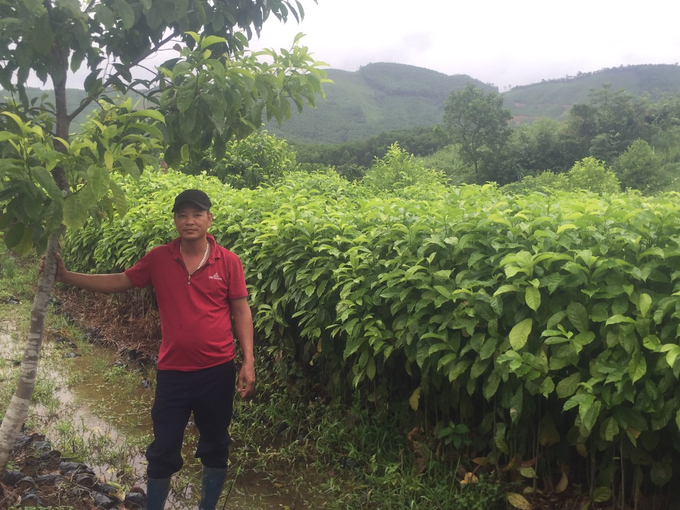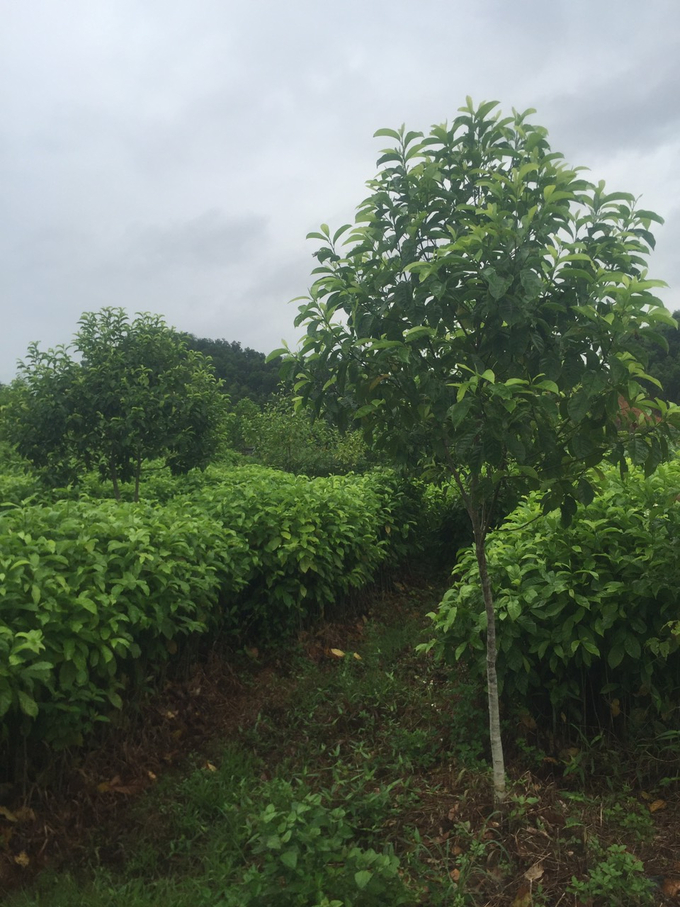May 17, 2025 | 15:07 GMT +7
May 17, 2025 | 15:07 GMT +7
Hotline: 0913.378.918
May 17, 2025 | 15:07 GMT +7
Hotline: 0913.378.918

Ba Che Sustainable Forestry Cooperative is a pioneer in growing grafted menghundor in the area. Photo: Nguyen Thanh.
The province of Quang Ninh is currently focusing on planning and managing three types of forests. The planned land area for forestry in the province is over 435,000 hectares, accounting for nearly 70% of the natural area. This includes 370,000 hectares of forested land, with a forest cover rate of 55%.
Quang Ninh has also issued Resolution No. 19-NQ/TU on sustainable forestry development until 2025, with a vision toward 2030. Specifically, by 2025, the province aims to have a large timber forest area of 5,000 hectares. Currently, the area of planted iron-wood, menghundor, and chukrasia trees in Quang Ninh is about 2,400 hectares.
To swiftly achieve the goal of establishing large timber forests, starting in 2020, specialized units of Quang Ninh’s Department of Agriculture and Rural Development have been implementing pilot projects for planting grafted menghundor and anise trees.
The menghundor tree, which produces edible seeds, is a valuable timber tree, with dried menghundor seeds priced at 2 - 2.5 million VND/kg. Normally, trees grown from seeds take over 10 years to bear fruit. However, trees grown from grafted seedlings can produce fruit within 3 years.
In Nam Son commune (Ba Che district), grafted menghundor trees have been experimented and propagated by local residents across tens of hectares. Mr. Dang Van Dat, Director of the Sustainable Forestry Cooperative in Ba Che, shared that the grafted menghundor trees have the advantage of flowering quickly, producing fruit after just 3 years of planting, and yielding a harvest from the fourth year.
"We hope that from the 5th year onward, the grafted menghundor trees will develop well, potentially yielding up to 10 kg of seeds per tree per year, thereby generating high profits. The grafted menghundor trees in Nam Son have the characteristic of low branching and early branching, making it easier for attention and harvesting", Mr. Dat said.
Building on the success of grafted menghundor trees, since late 2022, the Quang Ninh Agricultural Promotion Center has been implementing a grafted chukrasia tree model. So far, after 8 months of implementation, the survival rate of the trees has exceeded 90%, with heights ranging from 80 to 120cm and root diameters reaching 1.2 to 1.5cm.
The grafted chukrasia tree variety has the advantage of bearing fruit quickly, around the third year after planting, and having low branches to address the difficulty of harvesting tall trees. These trees are propagated through asexual reproduction (grafting), preserving the superior characteristics of the parent trees in terms of fruit yield, morphology, essential oil content and quality.

The grafted tree after about 4-5 months possesses a height of over 3 meters. Photo: Nguyen Thanh.
This tree variety also allows for refining the organic production process of anises to enhance productivity and product quality, creating a raw material area to meet export demands.
According to Mr. Nguyen Khac Dung, Director of the Agricultural Promotion Center of Quang Ninh, implementing the model of cultivating anise using grafted varieties is highly significant. This can be attributed to the fact that current forests of this variety in many areas mostly use unselected and untested seed sources, resulting in tall trees that are difficult to harvest.
Various unsynchronized technical measures, lack of care, and declining productivity over time, coupled with climate change impacts, have led to anise forests suffering degradation, pests, low yields, and suboptimal essential oil quality. The effectiveness doesn't match the production potential.
According to the Agricultural Promotion Center of Quang Ninh, the advantages of the grafted menghundor and anise models include the possibility of intercropping with medicinal plants, especially purple amomum. Intercropping aims to maximize short-term cultivation under the forest canopy, saving labor costs, increasing land utilization efficiency, and contributing to local economic development, in line with Resolution No. 19-NQ/TU on sustainable forestry development.
The model of intensive cultivation of large timber forests and transitioning from small timber to large timber is being implemented in Quang Ninh. This not only optimizes the utilization of natural and socio-economic conditions in the province but also opens up prospects for creating highly competitive forest products in both the domestic and international markets.
Translated by Nguyen Hai Long

(VAN) Muong Nhe Nature Reserve hopes that being upgraded to a national park will lay the foundation for forest protection efforts to be carried out in a systematic, modern, and sustainable manner.
/2025/05/16/3923-2-171845_52.jpg)
(VAN) Lower costs, higher yields, and improved soil quality are outstanding benefits that soybeans bring when integrated into the crop rotation system.

(VAN) The 'For a Green National Environment' programme aims to promote a green lifestyle, support businesses in implementing ESG practices, and turn Net Zero commitments into concrete actions.

(VAN) Cold-barn systems efficiently manage environmental and temperature conditions, which aids in the prevention of respiratory diseases in pigs and protects them from the vectors that transmit African swine fevers.

(VAN) To tackle challenges, the project 'Addressing key technical bottlenecks in the grouper supply chain in Vietnam' has been underway since 2024.

(VAN) The project 'Disease-Resilient and Sustainable Cassava Production Systems in the Mekong Region', funded by the Australian Center for International Agricultural Research (ACIAR), is being implemented from 2024 to 2028.

(VAN) Data from 10,000 farming households will help professionalize production organization and support the implementation of the One Million Hectares Program for High-Quality, Low-Emission Rice Cultivation.